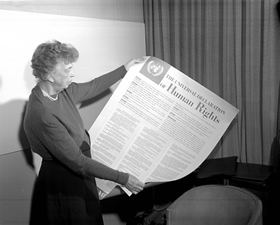About Us
-
About UN Human Rights
- Mandate
- Mission
-
The High Commissioner
- Volker Türk, High Commissioner
- Nada Al-Nashif, Deputy High Commissioner
- Ilze Brands Kehris, Assistant Secretary-General
-
Past High Commissioners
- Michelle Bachelet Jeria, Chile, 2018-2022
- Mr. Zeid Ra'ad Al Hussein, Jordan, 2014-2018
- Ms. Navanethem Pillay, South Africa, 2008-2014
- Ms. Louise Arbour, Canada, 2004-2008
- Bertrand Ramcharan (Acting High Commissioner)
- Mr. Sergio Vieira de Mello, Brazil, 2002-2003
- Mrs. Mary Robinson, Ireland, 1997-2002
- Mr. José Ayala-Lasso, Ecuador, 1994-1997
- Past Deputy High Commissioners
- Past Assistant Secretaries-General
- What we do
- Where we work
-
Funding and budget
- Our donors
- Funding trends
-
Trust funds
- Special Fund of the OPCAT
- UN Voluntary Fund for Indigenous Peoples
- UN Voluntary Fund for Technical Cooperation
- UN Voluntary Fund on Contemporary Slavery
-
UN Voluntary Fund for Victims of Torture
- Mandate
- About the Fund’s assistance for victims
- Board of Trustees
- How the Fund is managed
- Reports
- Activities
- 40th anniversary
- International Day in Support of Victims of Torture
- Videos
- Feature stories
- How to apply for an annual grant
- Annual grant cycle
- How to report on a grant
- Emergency grants
- How to contribute to the Fund
- Group of Friends
- Evaluation
- Memorial
About Us
-
About UN Human Rights
- Mandate
- Mission
-
The High Commissioner
- Volker Türk, High Commissioner
- Nada Al-Nashif, Deputy High Commissioner
- Ilze Brands Kehris, Assistant Secretary-General
-
Past High Commissioners
- Michelle Bachelet Jeria, Chile, 2018-2022
- Mr. Zeid Ra'ad Al Hussein, Jordan, 2014-2018
- Ms. Navanethem Pillay, South Africa, 2008-2014
- Ms. Louise Arbour, Canada, 2004-2008
- Bertrand Ramcharan (Acting High Commissioner)
- Mr. Sergio Vieira de Mello, Brazil, 2002-2003
- Mrs. Mary Robinson, Ireland, 1997-2002
- Mr. José Ayala-Lasso, Ecuador, 1994-1997
- Past Deputy High Commissioners
- Past Assistant Secretaries-General
- What we do
- Where we work
-
Funding and budget
- Our donors
- Funding trends
-
Trust funds
- Special Fund of the OPCAT
- UN Voluntary Fund for Indigenous Peoples
- UN Voluntary Fund for Technical Cooperation
- UN Voluntary Fund on Contemporary Slavery
-
UN Voluntary Fund for Victims of Torture
- Mandate
- About the Fund’s assistance for victims
- Board of Trustees
- How the Fund is managed
- Reports
- Activities
- 40th anniversary
- International Day in Support of Victims of Torture
- Videos
- Feature stories
- How to apply for an annual grant
- Annual grant cycle
- How to report on a grant
- Emergency grants
- How to contribute to the Fund
- Group of Friends
- Evaluation
- Memorial
The UN human rights programme started as a small division at UN Headquarters in the 1940s. The division later moved to Geneva and was upgraded to the Centre for Human Rights in the 1980s. The Vienna Declaration and Programme of Action, adopted at the World Conference on Human Rights (14-25 June 1993), made concrete recommendations for strengthening and harmonizing the UN's human rights monitoring capacity. The document called for the establishment of a High Commissioner for Human Rights by the General Assembly, which subsequently created the post on 20 December 1993 (resolution A/RES/48/141).

The growth in size and activities of UN Human Rights has paralleled the increase in the human rights machinery since the adoption of the Universal Declaration of Human Rights in 1948. Drafted as "a common standard of achievement for all peoples and nations," the Declaration for the first time in human history set out basic civil, political, economic, social and cultural rights that all human beings, without distinction, should enjoy. Non-discrimination and equality have been increasingly reaffirmed as fundamental principles of international human rights law and essential elements of human dignity.
Today, the body of international human rights law continues to expand and new human rights standards are being built on the Universal Declaration to address emerging human rights issues. In the 21st century, UN Human Rights has helped achieve greater protection of the rights of neglected population groups such as indigenous peoples, older people, people with disabilities, and people belonging to the LGBTI community. The Office has also brought to the fore the link between human rights and climate change.
Over time, a number of UN human rights bodies have been established to respond to evolving human rights challenges. They rely on UN Human Rights staff for both substantive and secretariat support in discharging their duties. These bodies include the Human Rights Council and its thematic and country mandated independent experts known as special procedures; and the 10 core treaty bodies of independent experts that monitor States' compliance with their treaty obligations.
Human rights have become central to the global conversation regarding peace, security and development. The integration of UN human rights staff in peacekeeping operations has significantly enhanced the UN's preparedness to prevent and respond to human rights violations. There is also a global consensus that serious violations of human rights must not go unpunished. The creation of the International Criminal Court in 1998 by the Rome Statute has allowed bringing perpetrators of war crimes and crimes against humanity to justice.
There is now a growing acknowledgement that business enterprises too have human rights responsibilities. In 2011, the UN Human Rights Council endorsed Guiding Principles on Business and Human Rights for implementing the UN "Protect, Respect and Remedy" Framework, providing – for the first time – a global standard for preventing and addressing the risk of adverse impacts on human rights linked to business activity.